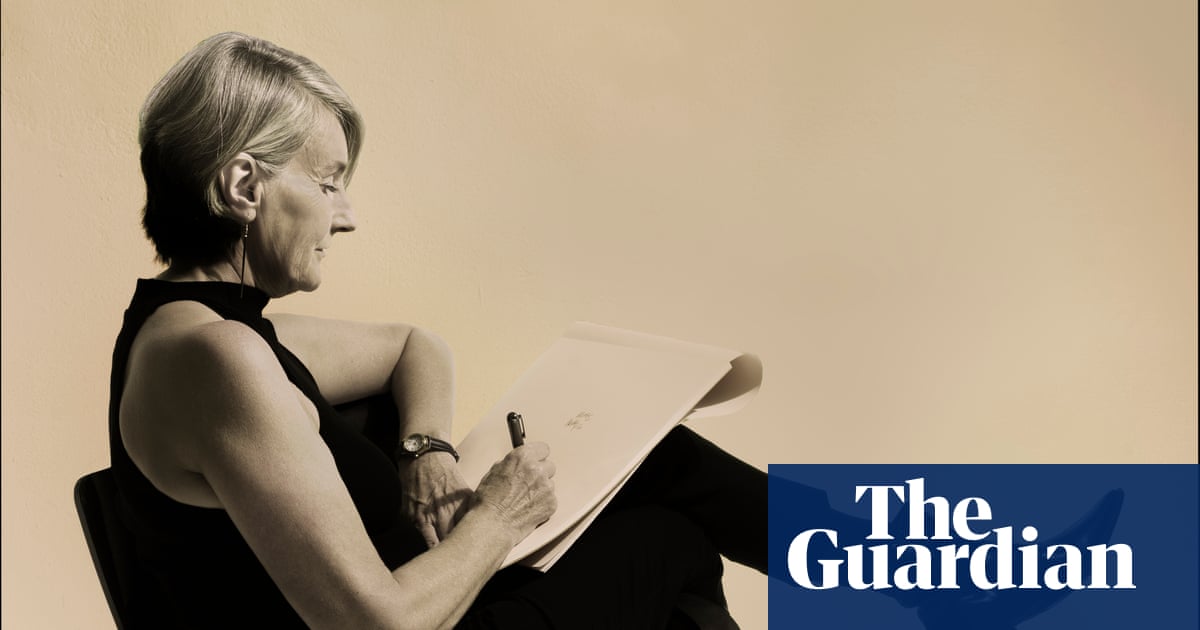

Born in Watford in 1960, Mary Portas is a business leader, media personality, and advocate. She started at Harvey Nichols in 1989 and departed in 1997 to establish the marketing firm Yellowdoor (now Portas). In 2007, her television career kicked off with the BBC Two show Mary Queen of Shops. She served as the retail tsar for the UK government in 2011 and is a co-chair of the Better Business Act. She is a mother of three – two children with her ex-husband, Graham Portas, and one with her former wife, Melanie Rickey. Her latest book, I Shop, Therefore I Am, is set to release on 2 October.
This photo was taken in my office at Harvey Nichols. I was still finding my footing as a creative director, and magazines were eager to feature me. The attire – Norma Kamali trousers paired with a Donna Karan bodysuit – subtly mirrored my identity. In my early twenties, I dressed to align with trends. Approaching my thirties, I recognized the need to focus on my personal style: vibrant, assertive, and precise.
My recollections from this era are filled with happiness and satisfaction. I felt confident at work, everything seemed novel and thrilling. I can recall thinking, “I am nailing this.” A pivotal sensation, as I had been adrift for quite a while.
In my youth, I was one of five siblings. I was rebellious and mischievous, always testing limits and uninterested in excelling academically or forming deep friendships. I attended a convent school and often found my mind wandering during class. By my teenage years, most of my brothers and sisters had moved out for studies or jobs. Then, unexpectedly, Mum passed away from meningitis.
Dad fell apart; he was unable to handle the situation. Even at 16, I became responsible for my younger brother, Lawrence. It wasn’t just the loss of Mum; my siblings, my mentors, my entire support structure were gone. Our home transitioned from a lively, chaotic Irish family setting – always filled with barking dogs and cooking smells – to one of silence and gloom. Mum was a pillar of strength and humor – the matriarch who held everything together. I didn’t even possess a house key since she was perpetually home.
In the 1970s, seeking therapy wasn’t an option. It was simply back to school on Monday and onward. I had secured a spot at Rada but opted for a college course in visual merchandising to take care of Lawrence instead. Upon arriving home, I would turn on the radio or TV, anything to fill the quiet. I started to try my hand at cooking, having never attempted it before. My brother would walk in. He was 14, and I could see his sorrow. I had no alternative but to step into the role of the responsible matriarch, a role I’ve maintained ever since.
After Mum’s passing, Dad entered a new relationship. He died two years later, leaving the family home to his new wife, thus making Lawrence and I homeless. We leaned on the generosity of others and lived with family friends in a council house. I wouldn’t want to dive into the mindset of the woman who took our home – I can’t fathom doing that to any child. She must have endured some pain herself. I hold no grudges, but I often reflect and mourn for my younger self – wishing I could travel back and comfort her.
Due to everything that transpired during those years, I never truly experienced being a teenager. I never touched drugs, attended large clubs, or rebelled. To this day, I’ve never been inebriated. Instead, that tragedy redirected my course – compelling me to dive into work. So that’s what I did. My achievements stemmed not from being the brightest but from my unwavering dedication.
By the time I reached 48, I was on television. The show was immensely popular – attracting 3.5 million viewers. I would walk down the street and people would greet me: “Hi Mary!” Suddenly, I was a public figure. I owned a business and was frequently traveling for speaking engagements. I had two children and was beginning to accumulate wealth. However, I was overwhelmed. I was too busy.
A friend suggested: “Why don’t you escape to this retreat? Take some time to relax?” I’m not one to take breaks, and I had never really prioritized self-care. Growing up, I watched my mother apply face cream, considering that sufficient pampering. But I agreed to go, and during that trip, I encountered a spiritual mentor. Anyone could converse with him. He would direct a chair towards me, encouraging me to share. One day, he handed me the Vedanta Treatise: The Eternities by Avula Parthasarathy, a guide to life and self-discovery rooted in ancient Indian philosophies. I didn’t comprehend a single word. However, I kept reading, and something within me began to shift. Each time I practiced yoga, tears would flow.
My spiritual journey was gradual, slowly integrating into my lifestyle over the years. I sought out teachers and thinkers, becoming more engrossed in their writings than binge-watching the latest shows. It wasn’t precisely an awakening, but a realization that I had been perpetually racing through life – moving from one task to the next without ever connecting to my innermost self.
While I wouldn’t label myself as a yogi, I meditate daily. And this has transformed my approach to work. A significant portion of business and consumerism has proven detrimental to society. I have to acknowledge my role in that. Additionally, we were conditioned to believe that success in business equated to aggression, but projecting negativity and anger will only bring that energy back to you. I don’t dislike earning money; I simply prefer to do it ethically.
When I was younger, no one ever remarked: “Here’s a kid with potential!” Even when I became display manager at Topshop at 25, I didn’t perceive myself as successful. During my Harvey Nichols tenure, even as the press called me Mary Queen of Shops, no one within the organization acknowledged my significance. Consequently, due to this and my inherent nature, I have never genuinely felt that I “arrived.”
For me, success isn’t just about attaining career milestones. It resides in moments like when my remarkable PA, Bean, once expressed: “What I’ve always admired about you is your ability to connect with both the CEO and the cleaner. Few can – or will – bridge that gap.” Or it’s in those times at home with my children, preparing meals or having simple conversations around the table. Recently, my brother came over to give us haircuts. Those small, everyday family instances are what hold the most significance.
Despite everything that’s transpired, I carry the belief that everything will turn out fine. This doesn’t imply I’m devoid of pain. In recent years, I have navigated a divorce. Ending a relationship is a remarkably challenging process. However, both she and I celebrated our son’s birthday not long ago. We’ve reached a positive understanding. That’s the crux of it: there have been seasons of profound challenges, yet also moments of joy. I’ve lived a richly textured life. If someone had told my younger self that this would be my adulthood, I would have said: “I’ll gladly check that box – thank you!”

